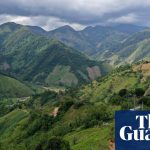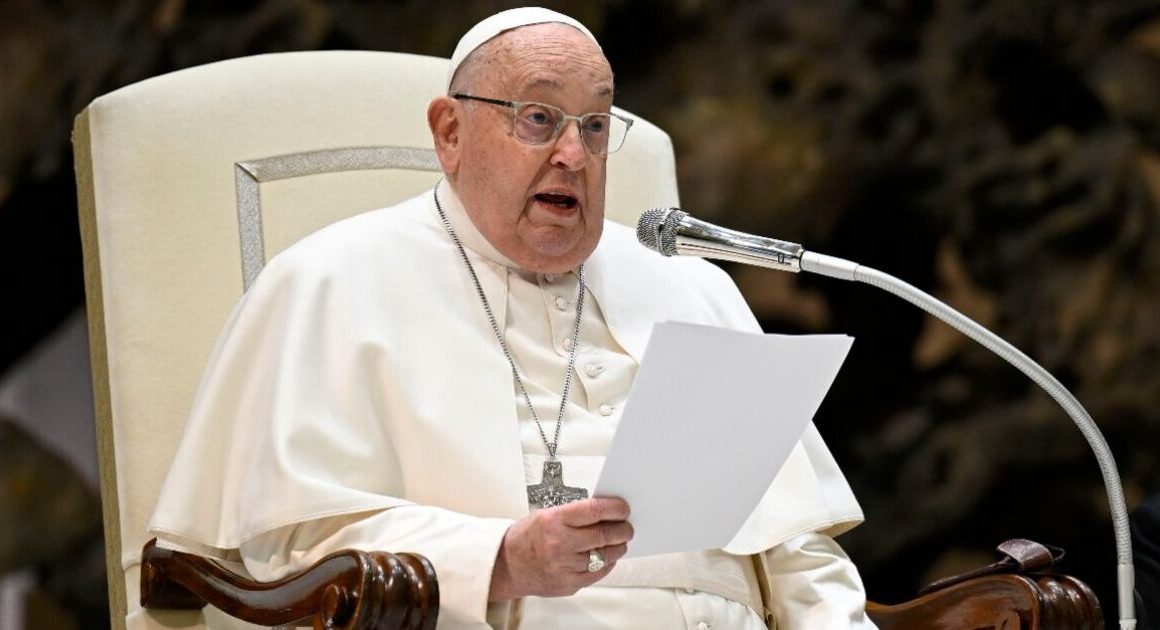“You see those white pinkish dots in front of us?” asked Xhemal Xherri, peering across a lagoon along the southern coast of Albania, across the Adriatic Sea from Italy.
“Dalmatian pelicans,” said Xherri. “Around 20 of them.”
The area is a vital breeding and feeding ground for southeastern Europe’s distinctive waterbirds — like the Dalmatian pelican, pink flamingos, ospreys and spoonbills — and a crucial stop on the Adriatic migration route for birds heading to North Africa.
Xherri comes to the area regularly to study and collect data on some 220 different bird species — some, like the pelicans, endangered — as project manager with the Protected and Preservation of Natural Environment in Albania (PPNEA). The NGO is part of a coalition of environmentalists, lawyers and opposition politicians trying to protect the last untouched Mediterranean wetland from destruction.

They’re doing so through protests, campaigns, lawsuits — and most essentially, Xherri says, by monitoring the 220 bird species in the Vjosa Narta Protected Landscape. It’s a hidden haven of beaches and cliffs; the sparkling Adriatic Sea on one side, the tranquil lagoon on the other.
“Through the monitoring, we have seen the intensity of the wildlife here and how important it is for bird migration,” said Xherri.
The area is now under threat by two luxury real estate projects — worth an estimated $1.5 billion Cdn — proposed by Ivanka Trump, daughter of U.S. president-elect Donald Trump, and her husband, Jared Kushner.
“We have this 1,400-acre island in the Mediterranean,” Ivanka Trump told podcaster Lex Fridman this summer. “We’re going to have the best architects, the best brands … it’s going to be exceptional.”
WATCH | Ivanka Trump talks about the Albania resort on Lex Fridman’s podcast:
Trump was referring to Sazan, a former military base off the coast of Albanian wetland, which along with the Narta lagoon in the delta of the Vjosa River would be transformed into an opulent resort of curved stone and glass villas overlooking a bay that will float with luxury yachts.
Environmentalists say the plans would destroy everything from the bird sanctuary to sand dunes where loggerhead sea turtles breed and nest.
‘Just the tip of the iceberg’
Xherri and other environmentalists have sued to halt the construction of Vlore International Airport. The airport is not only under construction within the protected area, but it is adjacent to another fragile ecosystem, the Vjosa Wild River National Park. Environmentalists say these plans would block birds from flying from one protected area to the other.
Construction began in 2021 without a permit, which has since been obtained, and a court decision to suspend it is still pending.
“Our fear is that it’s not going to be just the resort or the airport, but that there’ll be the whole infrastructure, too — the roads, the water supply,” said Xherri. “This is just the tip of the iceberg.”

But many in this struggling Balkan country see the development plans as essential in helping pull Albania out of poverty. In 2023, Albania’s GDP was $19 billion US, while that of its Italian neighbour across the Adriatic stood at $2.25 trillion US.
Until the early 1990s, after the Iron Curtain fell, Albania was one of the most cut-off nations in the world, ruled by paranoid communist dictator Enver Hoxha, who had 750,000 bunkers built, at massive cost, along the coast to protect it from an imaginary imminent invasion.
Now, the country is eager to develop its hundreds of kilometres of breathtaking coastline.
“I want Vlora to become a top tourist destination,” Mayor Ermal Dredha of Vlore, the town where the airport is being constructed, has told Reuters. “The quality starts with building something, not destroying, but building something in a sustainable way.”
PM sought Donald Trump’s business in the past
The government passed a new law in February that permits luxury hotels on land once set aside to protect sensitive wildlife and environmental zones. Critics say it was specially designed for the Kushner-Trump development, after Albanian Prime Minister Edi Rama met with them to discuss the possibility.
Agron Shehaj, leader of the opposition party Hope, says the deal is more evidence that Albania has become what he calls “a typical illiberal democracy.” That is, a country that on paper at least has democratic rights and a free press, but is in fact ruled by an autocrat, he says, referring to Rama, who has been in power for the past 12 years.
“It is a private deal of Rama using an important asset of Albania, [the] property of everybody, for himself, just to obtain political support from the United States,” Shehaj said in an interview with CBC.
Both Rama, who sought to work with Donald Trump during his first term as U.S. president, and Kushner have denied special treatment because of their connection to Trump.
Alongside suspicions of privileged access, the prospective development is also raising land ownership issues in Zvernec, an adjacent village where inhabitants fear traditional lands will be taken away by people outside the village.

“My forebears have lived here as far back as the Ottoman Empire, more than a century ago,” said an 80-year-old retired workman, who didn’t want to give his name for fear of reprisal.
“Outsiders are trying to steal it out from under us with false documents,” he said, referring to a real estate developer with a deed to the grazing and seaside land surrounding the village, which an Albanian court found fraudulent.
Locals worry about ‘wonderful birds’
The case is still under appeal, but many villagers, most of whom don’t have deeds, have little trust in their government.
On a new street of freshly built homes on the outskirts of town, Vera Biba, 62, and her husband, Vasil, 67, stood chatting in front of the house they’ve built and now retired to after 35 years of working in Greece.
“We want our village developed, we want more electricity, potable water and roads, not to have land taken away,” said Vera.
“When the airport is finished, all these wonderful birds will be gone,” said Vasil, pointing in the distance. “A group of environmentalists came and recommended the airport not be built, and they built it anyway.”

A two-hour drive up the coast, in the Albanian capital of Tirana, Vathi Besnik oversees a bustling travel agency near the sprawling Skanderbeg Square, which was built in communist times.
Besnik’s tourism career began in the early 1980s, under Hoxha’s isolated regime, when only small, strictly monitored groups of foreigners from select countries were allowed to visit, and men were required to cut their hair and shave to align with national dictates.
Besnik is also opposed to the luxury development in the Vjosa delta, but for different reasons.
While Western Europe grapples with over-tourism, Besnik says Albania can only dream of having to cope with such challenges. He said if Prime Minister Rama truly cared about Albania’s future, he’d push for deals that bring towering hotels to the wetlands — not exclusive resorts for the affluent few.
“It’s a political decision,” said Besnik. “To develop tourism, you need to have hotels to bring in revenues. There is only one reason to destroy nature: to live better, with more money. Sacrificing nature to have a better life.”
Xhemal Xherri knows that many Albanians, eager to see their country catch up to Italy and other EU nations across the sea, share his view. That’s why, he says, it’s up to the government to protect what much of Europe has already lost.
“There is huge pressure to build all over, but still, there is a way,” he said. “There are alternatives for sustainable development as well, but the government doesn’t aspire to that.”








